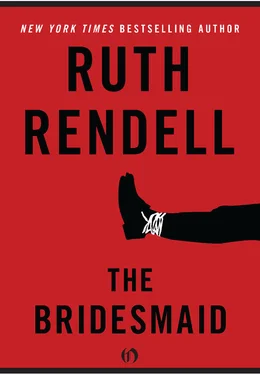Ruth Rendell - The Bridesmaid
Здесь есть возможность читать онлайн «Ruth Rendell - The Bridesmaid» весь текст электронной книги совершенно бесплатно (целиком полную версию без сокращений). В некоторых случаях можно слушать аудио, скачать через торрент в формате fb2 и присутствует краткое содержание. Год выпуска: 2010, Издательство: Open Road Integrated Media LLC, Жанр: Триллер, на английском языке. Описание произведения, (предисловие) а так же отзывы посетителей доступны на портале библиотеки ЛибКат.
- Название:The Bridesmaid
- Автор:
- Издательство:Open Road Integrated Media LLC
- Жанр:
- Год:2010
- ISBN:нет данных
- Рейтинг книги:3 / 5. Голосов: 1
-
Избранное:Добавить в избранное
- Отзывы:
-
Ваша оценка:
- 60
- 1
- 2
- 3
- 4
- 5
The Bridesmaid: краткое содержание, описание и аннотация
Предлагаем к чтению аннотацию, описание, краткое содержание или предисловие (зависит от того, что написал сам автор книги «The Bridesmaid»). Если вы не нашли необходимую информацию о книге — напишите в комментариях, мы постараемся отыскать её.
The Bridesmaid — читать онлайн бесплатно полную книгу (весь текст) целиком
Ниже представлен текст книги, разбитый по страницам. Система сохранения места последней прочитанной страницы, позволяет с удобством читать онлайн бесплатно книгу «The Bridesmaid», без необходимости каждый раз заново искать на чём Вы остановились. Поставьте закладку, и сможете в любой момент перейти на страницу, на которой закончили чтение.
Интервал:
Закладка:
All this brought Philip an uneasiness that was undesired at this phase in their relationship. He would have liked simply to exult in her renewed love, perhaps make reasonable and sensible plans for the future, thinking ahead to eventual marriage. Whether he actually wanted to get married for quite a long while he was less sure, but he knew there was no other woman he would ever be able to dream of marrying. Instead, he was made to feel very awkward by being asked to try to recall whether in a previous life he had been Alexander or Antony or Dante. He had, too, the problem of deciding if the fringe theatre part was a fantasy or actual fact.
A fantasy, he was pretty sure. That she had frequently told him the truth about her past didn’t mean she was invariably truthful; he had already persuaded himself of that. Her biggest fantasy was what he now had to cope with, and he put off his own moves in this rather unpleasant and absurd game from day to day. The more he did so, the more he thought about it and the more distasteful it became to him. Killing someone was such a monstrous thing, the worst thing one could do surely—which was why, of course, she talked about their doing it—so that even to have claimed to have done it when you hadn’t would be somehow wrong and even corrupting. Philip hardly knew what he meant by this term, but of the feeling he was certain.
Would a truly sane and normal man tell a woman he had killed someone, lay claim to murder, when he was actually quite innocent? And, come to that, could a person who said that be innocent? He knew he ought to be able to persuade her that this particular fantasy of hers was folly, wasn’t even very good for them to think about. If they loved each other as fully as he knew they did, they ought to be able to talk about anything to each other, explain everything. The fault, he thought, was as much his as hers. He knew he wasn’t a god, but when he protested, she merely told him he wouldn’t know if he was or not but in time the truth of it would be declared to him.
“We are Ares and Aphrodite,” she told him. “Those old gods didn’t die when Christianity came. They just hid themselves and from time to time are reborn in certain specially selected individuals. You and I are two of those individuals, Philip. I had a dream last night in which all that was revealed to me. We stood there on the curve of the earth’s globe in blinding light and we were dressed in white robes.”
He was by no means sure who Ares and Aphrodite had been, though with a good idea that they had existed only in the minds of men. In the minds perhaps of women like Senta? She told him that this pair of gods (they were called Mars and Venus too, which made better sense to him) had had many mortals killed, thought little of striking with death anyone who had offended them or even obstructed them by their very existence. Philip could scarcely think of anyone who had offended him, still less been a nuisance to him by existing. Once, not long ago, Gerard Arnham would have come into this category. Now it was unreal even to consider doing him harm.
On the Monday, which was more than a week after Senta had come back to him, he made up his mind that whatever the consequences to his own moral assessment of himself, he could put off this significant move no longer. Once done, it would be the end of his problems. Senta would see his love as proved, would play some similar game to prove her own, and with that behind them they could settle into their joyous relationship, which must reach the point of living together, becoming engaged, even marrying. He comforted himself with the notion—a brilliant one that had come to him unsought—that the reality of their love would before long cure her of this need to fantasise.
For once, it wasn’t a very busy day. He bought several morning papers on his way to work. Returning from an inspection of the refitted flats in Wembley, he bought an evening paper. The first batch hadn’t been rewarding. They had reverted, after nearly a year, to the case of the missing Rebecca Neave. Her body had never been found. Now her father and her sister were jointly setting up something called the Rebecca Neave Foundation. They were appealing for donations. These would fund a centre offering classes to women in self-defence and martial arts. A photograph showed Rebecca in the green velvet tracksuit she had worn when she disappeared. They would use a stylised representation of this for the foundation’s logo.
The Evening Standard had a follow-on story about Rebecca and two other girls who had gone missing in the past year. It also offered Philip a paragraph which seemed the very thing he was looking for. He read it sitting in the car in one of the parking areas at Brent Cross Shopping Centre where he had called to buy wine and strawberries and chocolates for Senta.
The body of a man found on a demolition site in Kensal Rise, northwest London, has been identified as that of John Sidney Crucifer, 62, described as a vagrant and of no fixed address. Police are treating the case as murder.
Senta herself had suggested to him that someone like that would do, pointing out the elderly bag woman who had sat with her back to the railings. The only difficulty would be if the police found the murderer of John Crucifer and it appeared in the papers. He didn’t like to think that Senta might not care if someone else were sent to prison for a crime he, Philip, had committed. But he was being stupid, wasn’t he? What did he mean, she wouldn’t care? It was all fantasy with her. She might not actually say she knew he hadn’t really killed anyone, but she knew he hadn’t. She knew already, she must know, that his undertaking to her was one of the moves in the game. Anyway, she never read newspapers, he had never seen her handle or even glance at a newspaper.
This John Crucifer would do. He needn’t worry about details, he needn’t worry even about the unlikely event of the case being blown up into something important, becoming of nationwide interest, because the truth was that Senta didn’t want the daylight of reality let in on it. She wanted dreams and, for once anyway, she should have them. A certain shame afflicted him as he sat there in the shopping centre car park. This was really caused by the idea of the conversation with Senta ahead of him in which he would have to tell her all this and witness her satisfaction. He would be lying and she would be accepting his lie as truth and they would both know it.
It was rather worse than he had imagined.
He went home first for his evening meal and got to Tarsus Street at about half-past seven. For by no means the first time that day, he found himself on the way carefully rehearsing the story he had prepared for Senta. He also had the piece from the Standard, which he had snipped out with Christine’s hair-cutting scissors, and a pound coin in his pocket for the old man called Joley.
His feelings about Joley remained superstitious. It was as if he had been appointed both the guardian of Senta and of their love, and yet it was not that in any real sense but more as if the old man had to be placated with gifts to keep Philip’s relationship with Senta secure. Some sort of malevolence would make itself felt if these pound coins were not forthcoming, a malice that might positively harm him and Senta. He had tentatively said something of this to her the night before—he was trying to supply flights of fancy of his own to match hers—and she talked of fees for a ferryman and sops for a dog that guarded the entrance to the underworld. This was mostly incomprehensible to Philip but he was glad to see Senta pleased.
Joley wasn’t there this evening. There was no sign of him or his trolley laden with coloured cushions. It seemed somehow a bad omen. A terrible temptation visited Philip to put off for another day the story he had to tell Senta. But when would the opportunity come again? There might not be another chance of this kind for weeks. He would have to do it, to stop thinking of it in this self-examining, excruciatingly analytical way, but just do it.
Читать дальшеИнтервал:
Закладка:
Похожие книги на «The Bridesmaid»
Представляем Вашему вниманию похожие книги на «The Bridesmaid» списком для выбора. Мы отобрали схожую по названию и смыслу литературу в надежде предоставить читателям больше вариантов отыскать новые, интересные, ещё непрочитанные произведения.
Обсуждение, отзывы о книге «The Bridesmaid» и просто собственные мнения читателей. Оставьте ваши комментарии, напишите, что Вы думаете о произведении, его смысле или главных героях. Укажите что конкретно понравилось, а что нет, и почему Вы так считаете.











